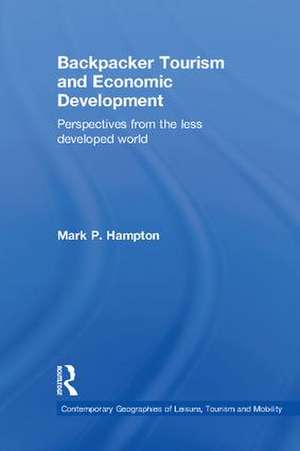Backpacker Tourism and Economic Development: Perspectives from the Less Developed World: Contemporary Geographies of Leisure, Tourism and Mobility
Autor Mark P. Hamptonen Limba Engleză Paperback – 25 mai 2017
This volume provides a focused review of the economic development impacts of backpacker tourism in developing regions furthering knowledge on how backpacker tourism can play a crucial role in development strategies in these areas. First, it reviews the origins of the backpackers with a detailed examination of their "hippy" predecessors on the overland trail, before discussing the emergence of modern backpackers including social and cultural aspects, and how new technologies are changing their experience. It then analyses the powerful economic development impacts of backpackers on local host communities in cities and rural areas with a special focus on coastal destinations. Extensive case study material is used from backpacker destinations across Asia, Latin America and Africa. In doing so the book provides original insights into how backpacker tourism is highly significant for poverty alleviation and effective local development since it has strong linkages to the local economy, and less economic leakage than conventional tourism.
Written by a leading academic in this area, this volume will be of interest to students of Tourism and Development Studies.
| Toate formatele și edițiile | Preț | Express |
|---|---|---|
| Paperback (1) | 436.14 lei 43-57 zile | |
| Taylor & Francis – 25 mai 2017 | 436.14 lei 43-57 zile | |
| Hardback (1) | 1056.35 lei 43-57 zile | |
| Taylor & Francis – 9 apr 2013 | 1056.35 lei 43-57 zile |
Din seria Contemporary Geographies of Leisure, Tourism and Mobility
-
 Preț: 311.41 lei
Preț: 311.41 lei -
 Preț: 311.41 lei
Preț: 311.41 lei -
 Preț: 311.41 lei
Preț: 311.41 lei -
 Preț: 326.49 lei
Preț: 326.49 lei -
 Preț: 325.97 lei
Preț: 325.97 lei -
 Preț: 324.71 lei
Preț: 324.71 lei -
 Preț: 311.51 lei
Preț: 311.51 lei -
 Preț: 296.80 lei
Preț: 296.80 lei -
 Preț: 310.65 lei
Preț: 310.65 lei -
 Preț: 233.53 lei
Preț: 233.53 lei -
 Preț: 356.63 lei
Preț: 356.63 lei -
 Preț: 355.44 lei
Preț: 355.44 lei - 18%
 Preț: 1057.89 lei
Preț: 1057.89 lei - 18%
 Preț: 1057.40 lei
Preț: 1057.40 lei - 30%
 Preț: 850.91 lei
Preț: 850.91 lei - 18%
 Preț: 1165.73 lei
Preț: 1165.73 lei - 18%
 Preț: 1379.90 lei
Preț: 1379.90 lei - 18%
 Preț: 706.16 lei
Preț: 706.16 lei - 18%
 Preț: 1058.69 lei
Preț: 1058.69 lei - 18%
 Preț: 1222.85 lei
Preț: 1222.85 lei - 18%
 Preț: 1056.00 lei
Preț: 1056.00 lei - 18%
 Preț: 1220.63 lei
Preț: 1220.63 lei - 18%
 Preț: 1115.21 lei
Preț: 1115.21 lei - 18%
 Preț: 1056.00 lei
Preț: 1056.00 lei - 31%
 Preț: 765.43 lei
Preț: 765.43 lei - 18%
 Preț: 1055.51 lei
Preț: 1055.51 lei -
 Preț: 415.67 lei
Preț: 415.67 lei - 18%
 Preț: 1051.10 lei
Preț: 1051.10 lei -
 Preț: 416.26 lei
Preț: 416.26 lei - 18%
 Preț: 1223.21 lei
Preț: 1223.21 lei -
 Preț: 396.40 lei
Preț: 396.40 lei - 18%
 Preț: 1117.07 lei
Preț: 1117.07 lei - 18%
 Preț: 1056.35 lei
Preț: 1056.35 lei - 18%
 Preț: 1127.34 lei
Preț: 1127.34 lei - 18%
 Preț: 1062.47 lei
Preț: 1062.47 lei - 26%
 Preț: 822.54 lei
Preț: 822.54 lei - 18%
 Preț: 1119.16 lei
Preț: 1119.16 lei - 18%
 Preț: 1060.74 lei
Preț: 1060.74 lei - 26%
 Preț: 990.17 lei
Preț: 990.17 lei - 28%
 Preț: 848.98 lei
Preț: 848.98 lei - 18%
 Preț: 1336.32 lei
Preț: 1336.32 lei -
 Preț: 488.33 lei
Preț: 488.33 lei - 18%
 Preț: 1395.61 lei
Preț: 1395.61 lei - 26%
 Preț: 822.54 lei
Preț: 822.54 lei - 18%
 Preț: 1066.09 lei
Preț: 1066.09 lei
Preț: 436.14 lei
Nou
Puncte Express: 654
Preț estimativ în valută:
83.45€ • 87.37$ • 69.05£
83.45€ • 87.37$ • 69.05£
Carte tipărită la comandă
Livrare economică 07-21 aprilie
Preluare comenzi: 021 569.72.76
Specificații
ISBN-13: 9781138081871
ISBN-10: 1138081876
Pagini: 184
Ilustrații: 20
Dimensiuni: 156 x 234 x 19 mm
Greutate: 0.45 kg
Ediția:1
Editura: Taylor & Francis
Colecția Routledge
Seria Contemporary Geographies of Leisure, Tourism and Mobility
Locul publicării:Oxford, United Kingdom
ISBN-10: 1138081876
Pagini: 184
Ilustrații: 20
Dimensiuni: 156 x 234 x 19 mm
Greutate: 0.45 kg
Ediția:1
Editura: Taylor & Francis
Colecția Routledge
Seria Contemporary Geographies of Leisure, Tourism and Mobility
Locul publicării:Oxford, United Kingdom
Public țintă
PostgraduateCuprins
1. What is Backpacker Tourism? 2. Cultural and Social Aspects of Backpackers 3. Who Wins, Who Loses? Backpacker Tourism and Economic Development 4. Guest Houses and Tattoo Parlours: Backpackers in Cities 5. The Beach and Full Moon Parties: Backpackers at the Coast 6. Policy Implications and Conclusions
Notă biografică
Mark P. Hampton is Senior Lecturer in Tourism Management at the University of Kent, and Director of the Centre for Tourism in Islands and Coastal Areas (CENTICA).
Recenzii
"The definitive study of backpacker tourism...The strength of this book is in the economic analysis."- John Connell (Aug. 2015) Austrailian Geographer
"Mark Hampton’s pioneering analysis of backpacker tourism’s economic potential is oft-cited and has influenced tourism policy makers in developing countries such as Malaysia to shift their previously negative attitude towards backpackers."
"This new book is a timely, comprehensive analysis. Mark’s experience as a backpacker illuminates his candid review of backpacker tourism’s evolution. His insight and scholarship are evident as he discusses how backpacking changed from a counter-cultural rite of passage to a mainstream, institutionalized market segment, and how hosting backpackers benefits developing countries. He has done justice to his subject in this authoritative, well-written account with wit and humour. This is a wonderful and fascinating book."- Professor Amran Hamzah, Universiti Teknologi Malaysia.
"A colourful and absorbing analysis of the history and economic impact of backpackers. Full of personal anecdotes from previous travellers, plus primary research about economic benefits arising from activities such as Full Moon Parties. It shows how backpacking has changed from ‘hippies’ to higher-spending tourists, often on gap years. An impressive, entertaining work that advances studies of both economic development and tourism." – Tim Forsyth, Times Higher Education
"This clearly written book merits a place on the reading lists of both undergraduate and postgraduate tourism courses relating to issues of tourism and development. It is fertile territory for students in search of challenging research topics relating to youth tourism in general and of backpacker tourism in particular." – Christian M. Rogerson, Annals of Tourism Research
“Overall, this nuanced and tightly focused analysis succeeds in its central contention that ‘‘backpacker tourism, whilst not a panacea, can in many cases play a significant role in local economic development and the alleviation of poverty’’ (p. 2). This clearly written book merits a place on the reading lists of both undergraduate and postgraduate tourism courses relating to issues of tourism and development. It is fertile territory for students in search of challenging research topics relating to youth tourism in general and of backpacker tourism in particular.” – Christian M. Rogerson, School of Tourism and Hospitality, University of Johannesburg, Published in Annals of Tourism Research
"Mark Hampton’s pioneering analysis of backpacker tourism’s economic potential is oft-cited and has influenced tourism policy makers in developing countries such as Malaysia to shift their previously negative attitude towards backpackers."
"This new book is a timely, comprehensive analysis. Mark’s experience as a backpacker illuminates his candid review of backpacker tourism’s evolution. His insight and scholarship are evident as he discusses how backpacking changed from a counter-cultural rite of passage to a mainstream, institutionalized market segment, and how hosting backpackers benefits developing countries. He has done justice to his subject in this authoritative, well-written account with wit and humour. This is a wonderful and fascinating book."- Professor Amran Hamzah, Universiti Teknologi Malaysia.
"A colourful and absorbing analysis of the history and economic impact of backpackers. Full of personal anecdotes from previous travellers, plus primary research about economic benefits arising from activities such as Full Moon Parties. It shows how backpacking has changed from ‘hippies’ to higher-spending tourists, often on gap years. An impressive, entertaining work that advances studies of both economic development and tourism." – Tim Forsyth, Times Higher Education
"This clearly written book merits a place on the reading lists of both undergraduate and postgraduate tourism courses relating to issues of tourism and development. It is fertile territory for students in search of challenging research topics relating to youth tourism in general and of backpacker tourism in particular." – Christian M. Rogerson, Annals of Tourism Research
“Overall, this nuanced and tightly focused analysis succeeds in its central contention that ‘‘backpacker tourism, whilst not a panacea, can in many cases play a significant role in local economic development and the alleviation of poverty’’ (p. 2). This clearly written book merits a place on the reading lists of both undergraduate and postgraduate tourism courses relating to issues of tourism and development. It is fertile territory for students in search of challenging research topics relating to youth tourism in general and of backpacker tourism in particular.” – Christian M. Rogerson, School of Tourism and Hospitality, University of Johannesburg, Published in Annals of Tourism Research
Descriere
This volume provides a focused review of the economic development impacts of backpacker tourism in developing regions furthering knowledge on how backpacker tourism can play a crucial role in development strategies in these areas. It firstly reviews backpacker origins with a detailed examination of their ‘hippy’ predecessors on the overland trail, before discussing the emergence of modern backpackers including social and cultural aspects, and how new technologies are changing experience. It then analyzes the powerful economic development impacts of backpackers on local host communities in cities and rural areas with a special focus on coastal destinations.







